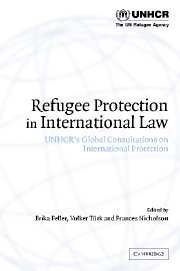Book contents
- Frontmatter
- Contents
- List of annexes
- Notes on contributors and editors
- Foreword
- Preface
- Acknowledgments
- Expert roundtables and topics under the ‘second track’ of the Global Consultations
- Table of cases
- Table of treaties and other international instruments
- List of abbreviations
- Part 1 Introduction
- Part 2 Non-refoulement (Article 33 of the 1951 Convention)
- Part 3 Illegal entry (Article 31)
- Part 4 Membership of a particular social group (Article 1A(2))
- Part 5 Gender-related persecution (Article 1A(2))
- 5.1 Gender-related persecution
- 5.2 Summary Conclusions: gender-related persecution, expert roundtable, San Remo, September 2001
- 5.3 List of participants
- Part 6 Internal protection/relocation/flight alternative
- Part 7 Exclusion (Article 1F)
- Part 8 Cessation (Article 1C)
- Part 9 Family unity (Final Act, 1951 UN Conference)
- Part 10 Supervisory responsibility (Article 35)
- Index
5.1 - Gender-related persecution
Published online by Cambridge University Press: 28 August 2009
- Frontmatter
- Contents
- List of annexes
- Notes on contributors and editors
- Foreword
- Preface
- Acknowledgments
- Expert roundtables and topics under the ‘second track’ of the Global Consultations
- Table of cases
- Table of treaties and other international instruments
- List of abbreviations
- Part 1 Introduction
- Part 2 Non-refoulement (Article 33 of the 1951 Convention)
- Part 3 Illegal entry (Article 31)
- Part 4 Membership of a particular social group (Article 1A(2))
- Part 5 Gender-related persecution (Article 1A(2))
- 5.1 Gender-related persecution
- 5.2 Summary Conclusions: gender-related persecution, expert roundtable, San Remo, September 2001
- 5.3 List of participants
- Part 6 Internal protection/relocation/flight alternative
- Part 7 Exclusion (Article 1F)
- Part 8 Cessation (Article 1C)
- Part 9 Family unity (Final Act, 1951 UN Conference)
- Part 10 Supervisory responsibility (Article 35)
- Index
Summary
Introduction
The principle of non-discrimination has been correctly described as fundamental to the concept of human rights. It is specifically affirmed, for example, in the Preamble to the United Nations Charter, the Universal Declaration of Human Rights, 1948, the International Covenant on Civil and Political Rights, 1966, and the Convention on the Elimination of All Forms of Discrimination Against Women, 1979. The principle of equality and the prohibition of discrimination has been reaffirmed and strengthened in a multitude of international human rights treaties. Observance, however, has been far from exemplary and this is no less true in the case of the Convention Relating to the Status of Refugees, 1951. In particular, it has not always been recognized that women and the girl-child enjoy the equal protection of the 1951 Convention.
From at least 1985, however, a concerted effort has been made by the Office of the United Nations High Commissioner for Refugees (UNHCR) to correct this inequity. The Executive Committee of the High Commissioner's Programme has similarly called upon States to recognize that refugee women who are victims of violence and persecution are in need of protection under the 1951 Convention. Thus, in October 1995, the Executive Committee:
call[ed] upon the High Commissioner to support and promote efforts by States towards the development and implementation of criteria and guidelines on responses to persecution specifically aimed at women … In accordance with the principle that women's rights are human rights, these guidelines should recognize as refugees women whose claim to refugee status is based upon well-founded fear of persecution for reasons enumerated in the 1951 Convention and 1967 Protocol, including persecution through sexual violence or gender-related persecution.
- Type
- Chapter
- Information
- Refugee Protection in International LawUNHCR's Global Consultations on International Protection, pp. 319 - 350Publisher: Cambridge University PressPrint publication year: 2003



